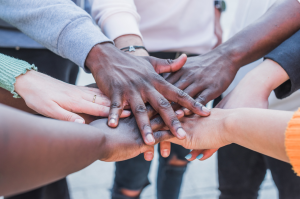Any robust and effective Diversity, Equity and Inclusion (DEI) strategy recognizes that diversity encompasses more than just demographics – it encompasses a spectrum of experiences, perspectives and identities. An organization’s ability to harness DEI as a value creating asset requires a multifaceted approach, implementing initiatives across multiple areas of the organization to build systems that drive meaningful, enduring change and enables employees from all backgrounds to thrive.
This is where Employee Resource Groups (ERGs) are fundamental. ERGs are employee-led affinity groups which serve as a hub for personal and professional development, and a safe space to foster inclusion. ERGs hold immense potential to transform the employee experience by driving a sense of belonging and providing a space for networking and discourse.
ERGs typically center around shared demographic characteristics or identities, although interest-based and professional development ERGs also exist. For the purposes of our discussion, we will focus on ERGs related to DEI, which span a diverse array of groups.
Some common ERGs include, but are not limited to:
Afro-Carribbean
Women and Other Gender Identities
Asian
LGBTQIA+
Indigenous
People with Disabilities
Single Parents
Military and Veterans
Led by employee volunteers, ERGs may vary in complexity, from those with formal leadership boards and bylaws to smaller, less structured committees. Regardless of size, the potential of an ERG to drive organizational change remains constant, they can advocate for and serve the needs of their members and allies. Here are some key areas where ERGs can make a profound impact:
Professional Development: Offering skill-building workshops, networking opportunities, and mentorship programs aimed at bridging the gap in accessing managerial and senior leadership roles.
Community Building: Fostering connections and relationships, particularly for individuals who may feel marginalised or underrepresented.
Allyship and Cultural Awareness: Providing a safe space for learning and discussions through educational events, workshops and cultural celebrations to promote understanding and respect for diverse identities.
Employee Engagement and Retention: Boosting engagement through ERG activities and by creating inclusive environments, which can contribute to cultivating a stronger sense of commitment to the organization and ultimately resulting in higher retention rates.
Recruitment and Talent Acquisition: Supporting recruitment efforts to attract talent from diverse backgrounds and showcasing an organization’s commitment to DEI by participating in community outreach or talent brand initiatives.
Advocacy and Policy: Advocating for and discussing DEI-related topics, sharing best practices and influencing policy changes to drive systemic transformation.
However, the efficacy of ERGs does not reside solely in their existence; rather, it hinges on the operational support to empower them to thrive. Let’s explore a few recommendations for organizations seeking to bolster their ERG program:
Aligning to the Broader DEI Strategy
Whether an organization is enhancing existing ERGs or establishing new ones, it is crucial to ensure the missions and initiatives of ERGs align with and have a clear purpose within the overarching DEI strategy. This may entail convening annual meetings with ERG leadership to collaboratively set objectives, identifying specific focus areas within the DEI strategy where ERGs can deliver significant contributions, or integrating ERGs into other DEI initiatives to optimise their involvement in the larger strategy. Moreover, facilitating transparent communication between the corporate DEI team and ERG leadership, as well as fostering communication among the various ERGs, helps prevent duplication of efforts in initiatives, leading to cross-collaboration and a more efficient use of resources.
Executive Sponsorship
Appointing executive sponsors who champion ERGs and serve as advisors can contribute to the growth and development of the ERGs. These sponsors can offer visibility, resources, and support for ERG initiatives, while also aiding in aligning their initiatives with broader organizational objectives. Establishing a practice where executive sponsors collaborate with ERG leaders to build annual plans, outline metrics and analyse feedback would be deemed optimal. Having an executive sponsor provides ERG teams with an advocate for securing funding and other resources necessary to execute high-quality initiatives.
Recognizing and Celebrating ERG Leaders
The individuals behind ERGs generously volunteer their time to ensure their groups are impactful for their colleagues. Therefore, companies may consider publicly recognizing and rewarding their ERG leaders. Some suggestions include organizing annual conferences for ERGs to meet and celebrate their successes, offering tokens of appreciation, acknowledging their commitment by highlighting their ERG leadership role during performance reviews, or providing benefits such as access to professional development workshops and networking opportunities. Some organizations may even offer monetary benefits, for instance increasing the employee’s salary to reflect the time and effort they are contributing to the ERG. Not only do these strategies demonstrate appreciation, but they also serve as additional incentives for employees to join ERG leadership, reframing ERG participation as a formal leadership development opportunity and expanding their teams.
Final Words
As we navigate the multifaceted nature of a diversity journey, let us recognize the indispensable role of ERGs in creating better workplaces for all. It is important to emphasize that ERGs do not influence organizational transformation on their own. This serves as a reminder that an organization’s HR, leadership and DEI Committee must work with their ERGs in a joint effort to ensure change is created.
Organizations must adopt a holistic approach to DEI that leverages the collective power of ERGs alongside other initiatives as they drive meaningful change and foster environments where every individual has a place within their organization. In order to sustain the momentum of progress and drive lasting change, organisations must not only acknowledge the pivotal role of ERGs but also invest in their growth and empower them to continue their vital work as allies in organizational transformation




